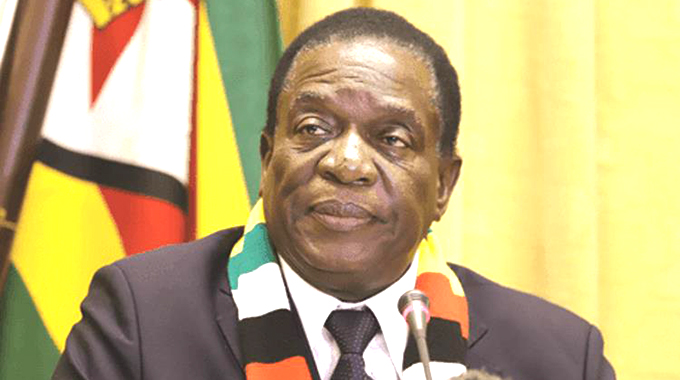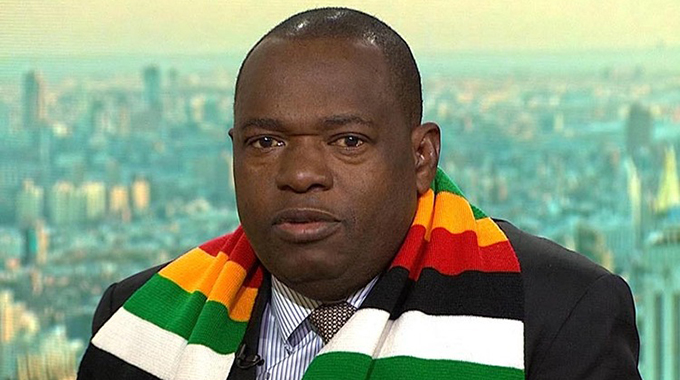Leaders show political maturity, Ubuntu

Livit Mugejo
Correspondent
Following the death of Ambuya Chamisa (may her soul rest in peace), it was encouraging to see all leaders across the political divide coming together in solidarity.
Mr Nelson Chamisa needs all the moral support at the moment.
President Mnangagwa did not disappoint as he led the way in consoling the grieving Mr Chamisa.
Foreign Affairs and International Trade Minister Dr Sibusiso Moyo was also there to console him and he was joined by many other leaders across the political divide.
What President Mnangagwa and Minister Moyo did was a true way of being African and statesmanlike.
These leaders have shown that as Africans, we should not allow our differences to define who we are. We are Africans and Zimbabweans first before our political affiliations.
One of the key pillars of democracy is tolerance.
The maturity of our democracy is measured by the way we engage with those who have a different view to our own.
In other words, our interpersonal relationships and engagements say a lot about who we are.
How do we engage with those we don’t agree with? Do we use logic, persuasion or tolerance to convince those who don’t share our views? What happened to our African way of solidarity?
These questions are at the centre and soul of Ubuntu as it was shown by our leaders.
Ubuntu is an African philosophy, which defines our way of life and finds expression through different maxims in many African languages.
In Shona, Ubuntu is depicted by the phrase “munhu munhu navamwe” (a person is a person through others).
In Ndebele and Zulu, it is depicted in the words “umuntu ngumuntu ngabantu” (a person is a person through others).
In Xhosa, the phrase is also the same: “umuntu ngumntu ngabantu” (a person is a person through others) and in Venda, the phrase is: “muthu ndi muthu nga vhathu” (a person is a person through others).
The above phrases imply that our lives are dependent on other people. They are linked or intertwined with that of other human beings.
Our existence gets meaning from our relationships with other people around us.

Minister Moyo
One, therefore, can deduce that each one of us can effectively exist as a fully functioning human being when one aligns to the valuable contribution of others in shaping one’s life, and one’s humanity, that is, shaping the self of the individual.
There is emphasis on solidarity, interdependence and love. Hence, an individual is an individual through others. His humanity is bound in another person’s humanity.
In short, the expressions above are best summed up by the words of John Donne (1571-1631): “No man is an island, entire of itself; every man is a piece of the continent . . . ”
Dear reader, what I am saying is that the culture of political polarisation and violence threatening to tear our societies, not only here in Zimbabwe, but in Africa is NOT part of who we are.
As Zimbabweans or Africans, we should live by the dictates of Ubuntu. We must live in harmony with each other.
Ubuntu in us demands that we maintain and foster good relationships with one another.
Above all, being a Zimbabwean or an African means we should respect the dignity of all the other people irrespective of their gender, age, totem, status and political affiliation in life.
As Zimbabweans, irrespective of the political affiliations, we should strive by all means to advance common good for the benefit of our nation.
Put differently, to be an African means, therefore, to belong to a large community, to be part of a large extended family and above all to be like the fish in water that live in harmony with its water.
Our communities have a long history of showing hospitality, compassion and caring to each other or even strangers.
Actually, we are always quick to find something common with a stranger to the extent that as Africans the word stranger stopped to exist in our vocabulary.
As former South African President Thabo Mbeki, said in his famous “I am an African” speech, problems are solved amicably.
The solidarity that President Mnangagwa and Minister Moyo showed to Chamisa is a true reflection of political maturity and Ubuntu.
Ubuntu defines Africans as part of a large diverse community which frowns at hate, segregation and envy directed against those who have a different view.
I am raising these issues not only because of politics, but because intolerance is prevalent at our homes, our political parties, at our churches and other social groups.
We will never get acceptance from others by shaming our own. Violence ought not define us.
The danger of using violence in our politics, for example, is that politics will remain an area preserved for those who are not talented, but with access to violence.
The talented will weigh the pros and cons of getting dirt.
In most cases, the talented are like capital. They shy and fly away from violence.
In short, one is a Zimbabwean and this greatly impacts his/her identity. Violence should never define him/her.
His/her continent is Africa and Africa is him/her.
Africa subscribes to the philosophy of Ubuntu, which teaches him/her that human beings need each other for their survival.
He/she is African because his/her identity values solidarity. One is what he/she is because of who he/she is in an African community.
The solidarity shown by our leaders to Chamisa this week taught us to go back to the Ubuntu basics, the philosophy which built or nurtured our identity.
There is definitely need for mental revolution in our country to be able to practise good politics, good business and, above all, good relations.
There is need to discard the dangerous disease that makes us easily resort to violence to solve our differences.
Survival as a people demands that we align our personal interests and political goals with those of our dear sisters, brothers, our community and the country at large.
Let the solidarity shown by the leaders extend beyond the grieving sector of our lives to other sectors of the economy such as the economic and political sectors to make Zimbabwe prosperous.
Livit Mugejo is the deputy director in the Ministry of Foreign Affairs & International Trade in charge of Policy Research & Communication Department. He writes in his personal capacity.







Comments